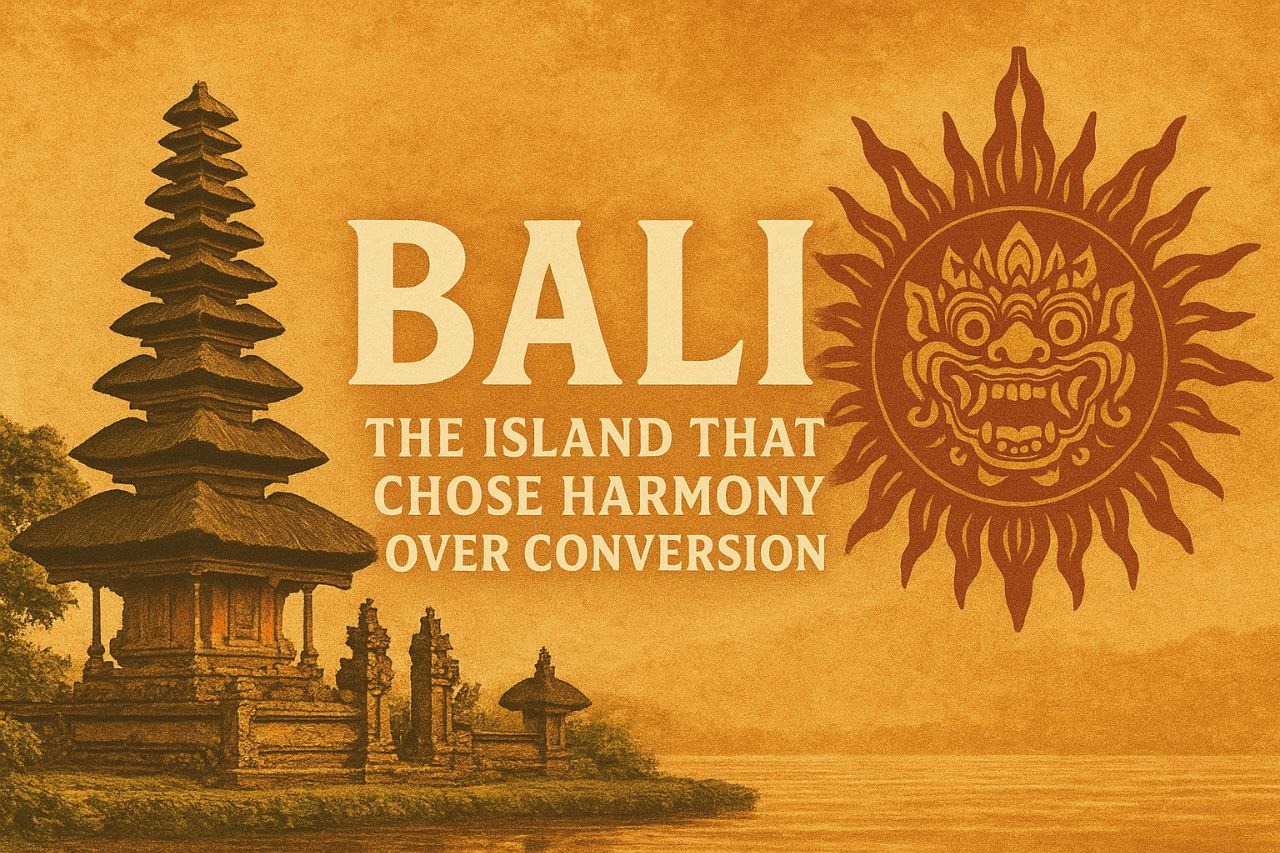Bali: The Island That Chose Harmony Over Conversion ~ A Forgotten Tale of Faith, Family, and Forgiveness

When you think of Bali, images of serene temples, intricate dances, and an unbroken thread of Hindu tradition come to mind. Unlike most of Indonesia, where Islam flourished centuries ago, Bali remained a bastion of Hindu-Buddhist culture. But why? The answer is not just in the annals of history, it lies in a deeply human story of love, loyalty, and a son's awakening.
The Majapahit Legacy
Centuries ago, the Majapahit Empire was the jewel of Southeast Asia, its influence stretching from Sumatra to Papua and beyond. Based in Java, it was a Hindu kingdom famed for its culture, trade, and diplomacy. At its helm was Emperor Kertabhumi (Brawijaya V), a ruler respected for his political skill and moral wisdom.
Among his relationships was a union with a Chinese Muslim princess from Thailand. From this union was born Prince Raden Patah, a child destined to bridge two worlds: Hindu-Buddhist heritage and Islamic faith.
"History is not only written in battles and treaties, but in the choices of the heart." ~ Adarsh Singh
The Prince Who Would Be Sultan
Raden Patah was raised under the guidance of Sunan Ampel, one of the nine revered Wali Songo (Islamic saints) credited with spreading Islam in Java. Sunan Ampel preached peace and persuasion, not violence.
The young prince grew ambitious and charismatic, drawing followers and eventually establishing The Sultanate of Demak, one of Java’s first Islamic kingdoms. But with power came a moral crossroads, his ambition brought him into conflict with the authority of his own father’s Majapahit Empire.
The Painful Rebellion
In a decision that would leave scars, Raden Patah rebelled against his father. Sunan Ampel warned him:
"You do realize you will be waging war against your own father? In Islam, rebelling against a parent is a sin."
But ambition prevailed. Raden Patah’s forces overpowered the Majapahit army, forcing them to retreat to Bali, a moment reminiscent of the desperate evacuations of history, such as Dunkirk in World War II.
A Father’s Quiet Resistance, Rooted in Sanatan Dharma
Once in Bali, Kertabhumi made a remarkable choice, he did not retaliate with force. This restraint did not come from fear; it came from the deep teachings of Sanatan Dharma, which values forgiveness, non-aggression, and coexistence over revenge.
Sanatan Dharma teaches that the divine exists in all beings, regardless of faith, and that the highest dharma is to protect life and harmony. Kertabhumi understood that war would only deepen wounds and destroy the sacred bonds of family.
"Victory without compassion is defeat of the soul." ~ Adarsh Singh
The Promise That Preserved an Island
When Raden Patah learned that his father had intentionally avoided direct conflict, he felt the weight of his actions. He saw not an enemy, but a man who loved him enough to lose without hatred. In reconciliation, Raden Patah promised:
1. He would never attempt to conquer Bali.
2. He would never force Hindus or Buddhists, followers of his father’s faith, to convert to Islam.
And here is the critical truth, Bali’s openness to Muslim settlers was not an Islamic principle of tolerance, but a Sanatan Dharma-driven gesture from Kertabhumi. He allowed Muslims to live, trade, and worship freely in Bali because his dharma taught him that truth has many paths, and coexistence is divine.
The Legacy of Coexistence
Islam spread across Java and other islands, but Bali remained a Hindu-Buddhist sanctuary. Its resilience was not the result of isolation, but of a conscious choice rooted in Sanatan Dharma’s inclusive philosophy.
"True faith is not in the power to convert others, but in the strength to let them be." ~ Adarsh Singh
A Lesson for Our Times
The story of Bali is not only about religion, it is about the eternal value of self-restraint, the moral courage to forgive, and the wisdom to protect diversity.
Sanatan Dharma’s principle of Vasudhaiva Kutumbakam, “The world is one family”, guided Kertabhumi’s actions. It ensured that even when political tides changed, the cultural heart of Bali beat on, untouched by forced conversion.
"Empires may fall, religions may spread, but respect for another’s soul is the true measure of greatness." ~ Adarsh Singh
Sat Aug 30, 2025
